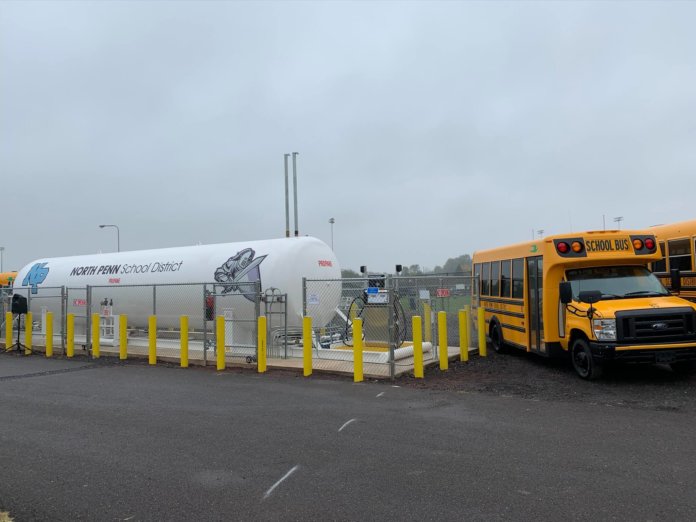North Penn School District in southeastern Pennsylvania has unveiled 14 new propane autogas school buses, comprising both Blue Bird Vision Propane and Micro Bird buses.
North Penn School District currently pays $0.97/gallon for propane compared with $2.04/gallon for diesel. The district has a newly installed, on-site fuel station with an 18,000-gallon tank capacity.
“Propane school buses make the most sense for us. Other types of alternative fuel school buses are cost-prohibitive and do not make sense for a school district our size,” says Angelo Tornetta, technician supervisor for North Penn School District. “Propane autogas operates clean and is much cheaper than diesel or compressed natural gas; plus, it costs less to maintain a propane school bus. So, it was an easy decision.”
The expansive district consists of 13 elementary schools, three middle schools, one high school and one credit recovery school. The district, which used Volkswagen Environmental Mitigation Trust funding to go toward the cost of the new buses, plans to purchase more propane buses with the money it will save in fuel and maintenance costs.
“North Penn School District is experiencing the cost- and emissions-reducing benefits by adopting Blue Bird propane school buses,” says Mark Terry, chief commercial officer of Blue Bird Corp. “We congratulate the school district on joining 900 other school districts across the nation lowering their total ownership costs from this domestically produced fuel.”
“The Ford engine with a ROUSH CleanTech propane fuel system exceeds today’s emissions standard at nearly 10 times lower NOx output, achieving California Air Resources Board’s optional, ultra-low certification,” notes Ryan Zic, vice president of school bus sales for ROUSH CleanTech, which supplies the fuel system for the buses. “Both the school district and surrounding community will benefit from cleaner air and also less maintenance costs, since the engine is so clean.”
The district’s drivers have been impressed with the power of the new propane buses and the low noise of the engines.
“With a propane bus, I am able to monitor activity inside the bus much better than I’d ever been able to before,” says bus driver William Gottshall. “If something is going on inside the propane bus, I know about it immediately,”
Bus driver Kerri Neumeye adds, “The propane bus has excellent acceleration. When pulling into four lanes of busy traffic, you want the extra power this bus has.”





